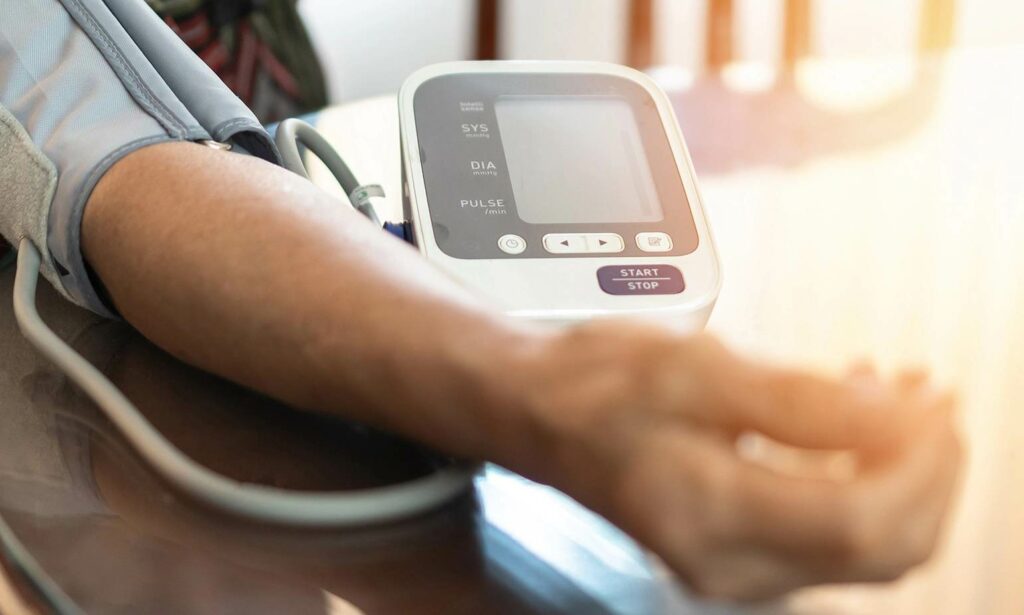Anxiety is a feeling of unease, such as worry or fear, that can be mild or severe. It is normal to feel anxious from time to time, but if you are constantly anxious, it can lead to health problems. One such problem is high blood pressure. This blog post will discuss the connection between anxiety and blood pressure and how you can manage them both!
Contents
What Is Anxiety?
 Anxiety is an emotion characterized by an unpleasant state of inner turmoil, often accompanied by nervous behavior such as pacing back and forth, somatic complaints, and rumination. It is not the same as fear, which is a response to a real or perceived immediate threat, whereas anxiety involves the expectation of a future threat.
Anxiety is an emotion characterized by an unpleasant state of inner turmoil, often accompanied by nervous behavior such as pacing back and forth, somatic complaints, and rumination. It is not the same as fear, which is a response to a real or perceived immediate threat, whereas anxiety involves the expectation of a future threat.
Anxiety is a feeling of uneasiness and worry, usually generalized and unfocused as an overreaction to a situation that is only subjectively seen as menacing. It is often accompanied by:
- Muscular tension
- Restlessness
- Fatigue
- Problems in concentration
It can be appropriate, but when experienced regularly the individual may suffer from an anxiety disorder. Therefore, it is important to be aware of the symptoms and causes of anxiety, as well as the various treatment options that are available.
How Are Anxiety And Blood Pressure Linked?
It is believed that anxiety and blood pressure are linked because anxiety can lead to an increase in heart rate and blood pressure. When someone is anxious, their body goes into “fight or flight” mode. This means that the body releases adrenaline and other stress hormones, which can cause the heart to beat faster and the blood vessels to constrict. This can lead to an increase in blood pressure.
Another way that anxiety and blood pressure may be linked is through the autonomic nervous system (ANS). The ANS controls things like heart rate, blood pressure, and digestion. People with anxiety often have an overactive ANS, which can lead to problems like high blood pressure.
In addition, there is some evidence to suggest that anxiety can contribute to atherosclerosis, which is the buildup of plaque in the arteries. This can further increase blood pressure.
All in all, the connection is strong because anxiety raises your heart rate as well as blood pressure. You should always consult with a doctor if you think that you may have anxiety so that it can be treated properly. Otherwise, it could lead to more serious health problems down the road.
How Much Does Anxiety Raise BP?
 People with anxiety tend to have higher than normal blood pressure. For some people, this may not be a big deal and they may not even know that their anxiety is causing their BP to be high. But for others, this can lead to serious health problems like heart disease.
People with anxiety tend to have higher than normal blood pressure. For some people, this may not be a big deal and they may not even know that their anxiety is causing their BP to be high. But for others, this can lead to serious health problems like heart disease.
So how much does anxiety raise BP? While there is no definitive answer, studies have shown that anxiety can increase BP by up to 20 points. This may not seem like a lot, but it can be enough to cause serious health problems.
For instance, a person with anxiety may have a BP of 140/90. This is considered to be hypertension or high blood pressure. If left untreated, hypertension can lead to heart disease, stroke, and other serious health problems. In anxiety, the BP may not stay high all the time, but it can fluctuate and spike during times of stress. This can make it difficult to manage and control.
Fortunately, there are ways to manage anxiety and blood pressure. But the very first thing that you should do is talk to a professional and try some self-care ways to manage both things.
How Does It Impact Your Life?
Anxiety and blood pressure can be a vicious cycle. When you have anxiety, your blood pressure goes up. This can lead to more anxiety and cause your blood pressure to spike even higher. Over time, this can take a toll on your body and your overall health. Some common negative consequences that this can have include:
- High blood pressure can damage your heart and lead to heart disease.
- It can also damage your arteries, which can lead to stroke or other problems.
- Anxiety can make it hard to concentrate, which can impact your work or school performance.
- It can also affect your sleep, which can lead to fatigue and other problems.
These consequences can have a significant impact on your life. If you are struggling with anxiety and blood pressure, it is important to seek help. There are many resources available that can help you manage your anxiety and lower your blood pressure. You just need to reach out and ask for help.
It might be difficult to talk about your anxiety, but it is important to remember that you are not alone. Many people struggle with anxiety and blood pressure. There are many resources available to help you manage both conditions. Do not be afraid to reach out and ask for help.
How To Manage It?
 When you have anxiety, your body goes into fight-or-flight mode. This causes your heart to beat faster and your blood vessels to constrict. This can lead to an increase in blood pressure. If you have anxiety and high blood pressure, it’s important to manage both conditions.
When you have anxiety, your body goes into fight-or-flight mode. This causes your heart to beat faster and your blood vessels to constrict. This can lead to an increase in blood pressure. If you have anxiety and high blood pressure, it’s important to manage both conditions.
There are a few things you can do to manage anxiety and blood pressure:
Get regular exercise
Exercise can help reduce stress and anxiety. Because when you consider the fact that when you have anxiety, your body is in a constant state of stress, it makes sense that regular exercise can help to alleviate some of the symptoms. Exercise releases endorphins, which have mood-boosting effects. There are even various types of exercises from which you can choose, depending on your preference.
Mindfulness meditation
Mindfulness meditation is a form of mindfulness that helps you focus on the present moment. This can help you to be more aware of your thoughts and feelings and may help to reduce anxiety. One study found that people who participated in mindfulness meditation had lower blood pressure than those who didn’t meditate.
Avoid caffeine and alcohol
It is important to avoid or limit your intake of caffeine and alcohol if you have anxiety. Caffeine can increase anxiety symptoms, while alcohol can cause you to feel more relaxed in the short term but can worsen anxiety in the long term. For example, if you have social anxiety, alcohol may make you feel more relaxed at first, but it can also make your symptoms worse.
Eat a healthy diet
Many people with anxiety disorders have an unhealthy diet. A healthy diet can improve your mood and help you manage your weight. There are some common things that you must include in your diet for anxiety such as:
- Omega-three fatty acids
- Probiotics
- Vitamin B-12
Get enough sleep
Sleep is connected to anxiety in many ways. For one, being sleep deprived can lead to feeling anxious. But also, if you have anxiety, it can be hard to fall and stay asleep. This creates a vicious cycle in which anxiety leads to less sleep, and then less sleep leads to more anxiety. To help break this cycle, focus on getting enough sleep.
This means going to bed and waking up at the same time each day, even on weekends. It also means disconnecting from electronics an hour before bedtime and creating a relaxing bedtime routine. If you have trouble sleeping, talk to your doctor about possible solutions.
Talk to a therapist
A therapist can help you manage your anxiety and understand its triggers. If you’re anxious about going to the therapist, ask a friend or family member to go with you. Some common therapies that are proven to help with anxiety and blood pressure include:
- Cognitive behavioral therapy
- Interpersonal therapy
- Acceptance and commitment therapy
- Dialectical behavior therapy
- Mindfulness-based stress reduction
Consider medication
 If you are facing severe anxiety, your doctor may prescribe medication to help you manage your symptoms. Medication can be an effective treatment option for anxiety, but it is important to work with your doctor to find the right type and dosage of medication for you.
If you are facing severe anxiety, your doctor may prescribe medication to help you manage your symptoms. Medication can be an effective treatment option for anxiety, but it is important to work with your doctor to find the right type and dosage of medication for you.
There are a variety of different medications that can be used to treat anxiety, and your doctor will work with you to find the one that is best for you. Medication can be an effective treatment option, but it is important to work with your doctor to find the right type and dosage of medication for you.
Join a support group
This is an effective way to share your experiences with others who understand what you are going through. You can also learn from how they deal with their anxiety. This will help you see that you are not alone and that there are people who care about you. There are various types of groups so you have to choose the right one for you.
All in all, these are some things that you can do to manage your anxiety and blood pressure. Remember that you should consult with your doctor first before trying out any of these. They will be able to help you come up with a plan that is tailored for you. Do not hesitate to ask for help if you feel like you are struggling.
Conclusion
In conclusion, anxiety and blood pressure are closely related. When you experience anxiety, your blood pressure may rise. However, there are things that you can do to manage your anxiety and keep your blood pressure in check. If you’re concerned about your blood pressure, talk to your doctor.
They can help you determine if your anxiety is causing your high blood pressure or if there is another underlying condition. Several things that you can do to manage your anxiety and keep your blood pressure in check.
For more tips and guidance, you can reach out to Therapy Mantra. The team of professional counselors is more than happy to help you in your journey to recovery. Contact us today to learn more about our services. You can also book an online therapy session or download our free Android or iOS app.


